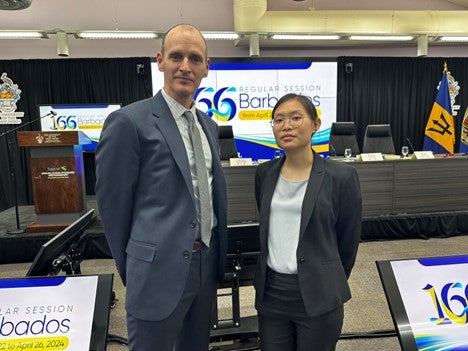Historic Hearings on Climate Change at the Inter-American Court of Human Rights
Earthjustice attorneys will be presenting before the Court
Contact
Today, a historic hearing on climate change begins before the Inter-American Court of Human Rights (IACtHR) in Barbados. At the conclusion of this process, the Court is expected to issue an advisory opinion to clarify countries’ legal obligations to protect human rights in the face of the ongoing climate crisis. Earthjustice attorneys Mae Manupipatpong and Jacob Kopas will be presenting before the Court on Thursday afternoon as part of the hearings. The hearings will be streamed online and conducted in Spanish, English, and Portuguese.
Last year, Colombia and Chile requested that the Inter-American Court lay out nations’ legal obligations for responding to the climate crisis under the American Convention on Human Rights. The Court, a regional human rights tribunal established under the 1969 American Convention on Human Rights, has in a prior advisory opinion and in a recent case acknowledged the inextricable link between protection of the environment and the enjoyment of human rights.
Chile and Colombia’s request asks the Court to provide clarity on the nature and scope of a broad range of legal issues including the obligations to mitigate and adapt to climate change, to protect disproportionately impacted communities, and to respect rights of access to information, participation, and justice.
In an amicus brief submitted last year, Earthjustice urged the court to outline specific obligations for governments to mitigate climate change, including phasing-out fossil fuel production and promoting a just transition to clean and renewable energy. More developed countries that have contributed historically more greenhouse gas emissions are better positioned to halt all production and burning of fossil fuels. However, all countries have the obligation to start phasing out fossil fuels, alternatives to which are readily available, cost effective, and can help support long term development goals.
The court could issue an advisory opinion that would guide climate and energy policy of many countries in Latin America and the Caribbean. Prior advisory opinions have been highly influential in shaping the development of constitutional rights in legal systems throughout the region and have been directly cited by Supreme Courts and Constitutional Courts in Mexico, Colombia, and Argentina, among other countries.
Statement from Earthjustice attorney Jacob Kopas:
“The Inter-American Court’s advisory opinion comes at a crucial moment in the global climate crisis. The policies and actions countries take — or fail to take — will decide whether we will live in a stable, healthy climate. As an authoritative voice on international human rights law, the court is in a unique position to show that ending fossil fuel use is one of the best ways to protect human rights and ensure a healthy and livable environment for all people.”

Additional Resources
About Earthjustice
Earthjustice is the premier nonprofit environmental law organization. We wield the power of law and the strength of partnership to protect people's health, to preserve magnificent places and wildlife, to advance clean energy, and to combat climate change. We are here because the earth needs a good lawyer.